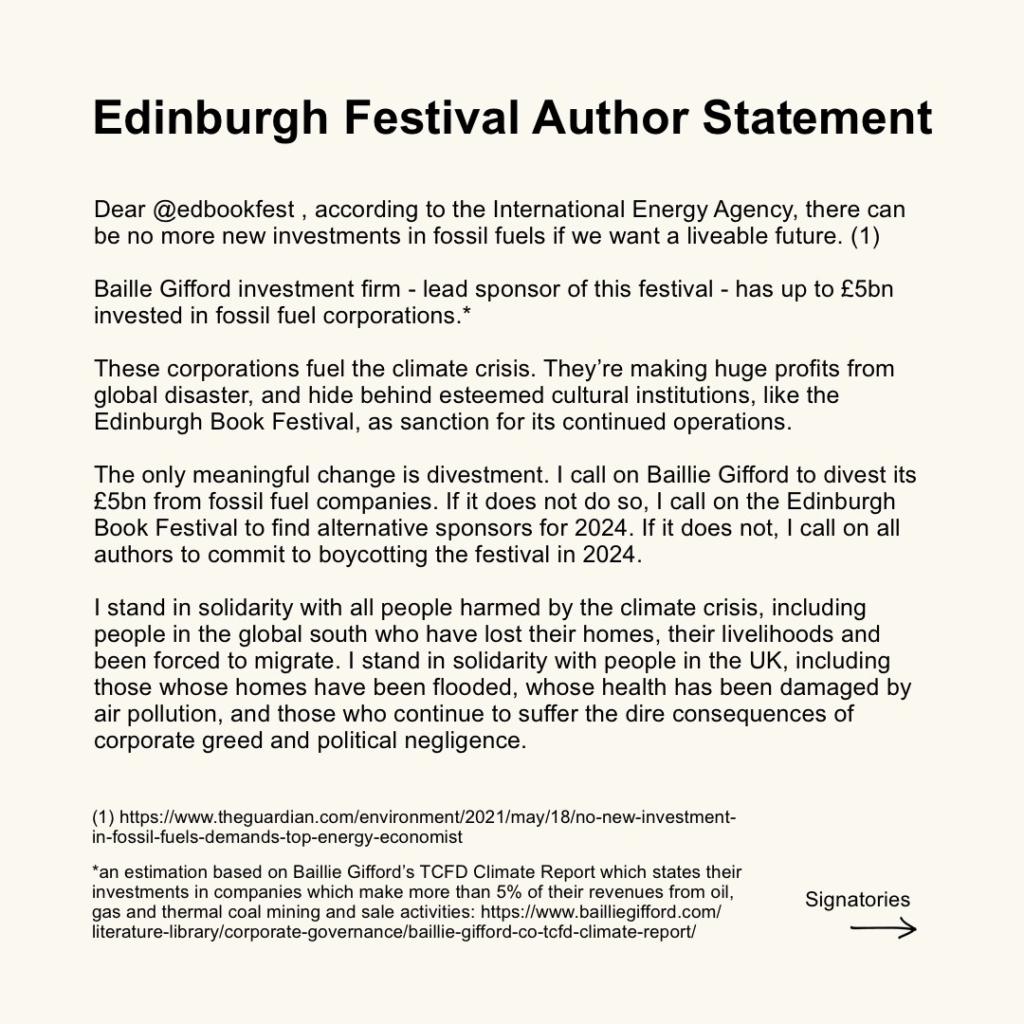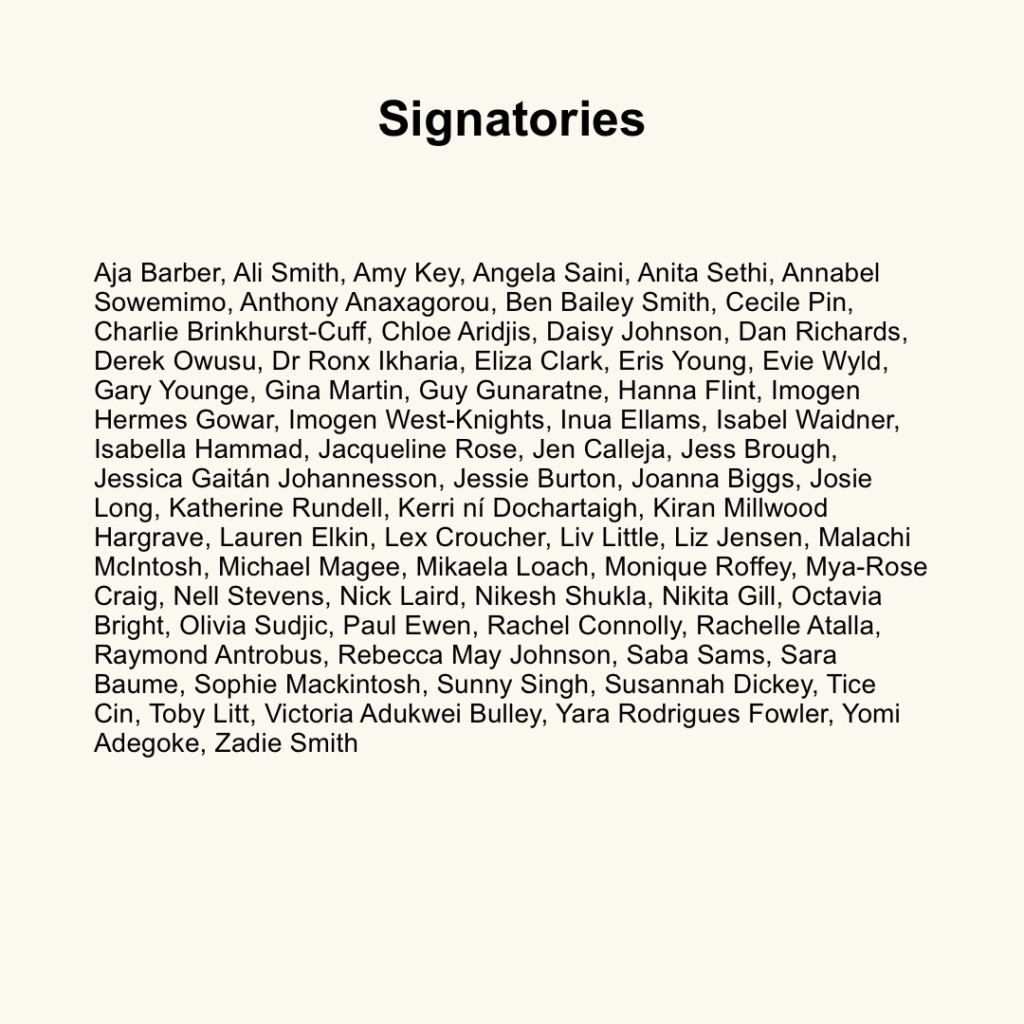Writers Threaten Edinburgh Book Festival Boycott
As we reported earlier in the week – the Edinburgh Book Festival has come under fire when The Ferret revealed the extent of fossil fuel investment of its main sponsor, Baillie Gifford. The revelations led to Greta Thunberg pulling out of her scheduled appearance. Now more than 50 of the authors and event chairs taking part in this year’s festival – which gets underway this weekend – have said that if main sponsor Baillie Gifford does not divest billions of cash, the festival organisers should find alternative sponsors. If this does not happen, the group have said all authors should “commit to boycotting the festival in 2024”.
The authors include Scottish climate activist Mikaela Loach (author of ‘It’s Not That Radical’), Ali Smith as well as Gary Younge and Zadie Smith. The group have stated: “These corporations fuel the climate crisis. They’re making huge profits from global disaster, and hide behind esteemed cultural institutions, like the Edinburgh Book Festival, as sanction for its continued operations.”
The group said they “stand in solidarity with all people harmed by the climate crisis, including people in the global south who have lost their homes, their livelihoods and been forced to migrate”.
Yara Rodrigues Fowler, author of There Are More Things, said: “This summer has been defined by global wildfires, flooding and extreme heat: the climate crisis is here.
“In the midst of climate breakdown, Baillie Gifford is investing almost £5bn into the cause of this crisis: companies that profit from the fossil fuel industry.
“Edinburgh International Book Festival allowing them to sponsor cultural events gives them a social licence to continue funding the destruction of our only home.”
Here’s their statement:


Greta Thunberg’s boycott provoked an angry reaction from Edinburgh’s establishment but no seems to be gathering strength from the very people the book festival depends on. The issue of artwashing and divestment from fossil fuels now seems to be reaching a critical point as pressure grows for ethical investment in the arts.

Good for Greta and congratulations to other writers who are supporting her: capitalism must die or it will kill all life on our finite planet before too long.
Don’t worry. Capitalism, our current form of life, will evolve from its own immanent catastrophe. Life will go on; it’s what it does.
More cobblers. How about these individuals first divest themselves of the products of “fossil fuels”, including anything made of plastic or from oil, obviously? We depend on fossil fuels for the cheap energy which is the foundation, the “sine qua non” of economic success. Oil is the basis of many plastics and washing up liquids, remember Byprox?. These people are pretty much of the same group as have resisted nuclear power. The notion that wind and solar power can replace gas and coal has not been demonstrated to be reliable or cheap (a lack of end to end cost benefit analyses). Hydro electric power is often a con, companies generating expensive electricity for the consumers during the day, then lowering prices to themselves at night when they pump all the water back into the reservoir.
“Ethical investment” in the arts? How? Donors to be interrogated and investigated in depth? How about investigating MPs and councillors in depth…?
No such thing as economic success on a dead planet
Economic success does indeed depend on cheap energy. But the energy we get by burning fossil fuels isn’t cheap; it has a huge environmental cost, which currently isn’t accounted for.
Onshore wind power is now the cheapest form of electricity available. If Westminster had not stopped development all our bills would be lower now.
By the way I like your suggestion to investigate politicians and councillors in depth – are you intending to use rubber gloves in investigations?
The censorious and intolerant dogmatism of the insidious cult of the morally righteous Wokerati strikes again to stifle freedom of expression in public debate.
Joe Soap knows that he needs his petrol-driven car and that he needs petrol to be available for it. Julian and Tarquin can maybe afford an electric car, but most people can’t, not that it would be much use anyway.
For petrol to be available there has to be investment in production and distribution of petrol, which is a socially responsible activity, as is sponsoring book festivals.
Transitioning to net zero takes time and necessarily involves continued investment in the oil industry, whether we like it or not and whether it offends the easily offended or not.
LOLs. The rich drive SUVs – the poor use public transport.
“Transitioning to net zero involves continued investment in the oil industry”
LOls. Genius.
But no one is stifling the freedom of expression of any of these writers. They’re choosing not to participate in the book festival for reasons they’ve made clear. Nor are they by their action preventing anyone else from participating in the festival.
I don’t see the problem.
‘They’re choosing not to participate in the book festival’
They are threatening not to participate in a future book festival.
As far as I am aware, several of these writers will be participating in this year’s event and none of them has followed Greta Thunberg’s example of withdrawing.
This is the St Augustine approach; make me principled, but not till next year.
I stand corrected, florian.
I must say that the suspended nature of their boycott makes their principled stance seem little more than an affectation.
By the way, if you follow Augustine’s enjoinder to ‘pick up and read, pick up and read, and again pick up and read’, you’ll find that his famous prayer, ‘make me good, but not just yet’ occurs in a passage in which he speaks with characteristic irony of a conception of moral authority that’s very different from ours and through the image of a commonplace adolescent dithering between libido and restraint.
Augustine, an outsider native Berber, spent ten years as professor of rhetoric in Milan and assumes throughout his Confessions the rhetorical device of the ‘unreliable narrator’, a narrator whose credibility is suspect. The effect is to make everything the narrator says in the Confessions, his confessions himself, doubtful or open to question. Reading Augustine is in that regard akin to reading Kierkegaard; his truth is not literal but rhetorical, not direct but indirect.
Augustine’s project seems to have been to aid the deconstruction of the mysticism-cum-formalism of the Platonic philosophers in the end times of the Roman world, who reckoned one could use a clear, learnable method to make contact with the universe in a moment of revelation. For Augustine, this route to enlightenment was blocked by one’s ‘fallen’ nature, by human fallibility, which vitiates all human enquiry and understanding. The truth is concealed by our own complex psychology as human beings, from which one can never escape. Augustine’s image of himself as dithering between libidinous exercise and restraint is a kind of cipher for this compromised condition we all find ourselves in in relation to truth. We are all ‘unreliable narrators’ of our own lives.
Augustine’s prescription is we eschew Platonic truth-merchants and embrace one’s own inescapable subjectivity, what Kierkegaard (following Augustine) called ‘the exhilarating discovery that the inner self, standing ironically apart from the public man, knows itself better than anyone else can know’.
A more complex figure emerges from a careful reading of Augustine. The internal ‘struggle’ of his unreliable narrator becomes a carefully stage-managed rhetorical exercise in the struggle between piety and mysticism, between experimentalism and formalism, in the end times of the Roman Empire.
Aww naw. I thought you’d been sacked?
Based on your rant- first paragraph is a doozy you want to keep investing in oil industry so you can keep inhaling it.
Signed
Tarquin, the vegan,woke transsexual.
Happy now?
The tragedy is everybody and nobody is sort of right – sort of, but also not really.
The immediate reality is artists commit intellectual suicide and topple things like book festivals while corporations continue unchecked.
Meantime so-called ‘net zero’ will come sooner than we think, and not according to anybody’s plans.
Yes, it will be brutal, due to our massive network of oil-related dependencies correctly outlined by critics above.
Middle class entitlement, conscious and unconscious, which drives both sides in the ‘debate’, alarmist and denialist equally, will be dust.
Humanity if and where it survives, will change and adapt wherever it can.
The planet won’t die.
The trick will be not to become ugly.
Wisdom is contentment without illusions.
“The immediate reality is artists commit intellectual suicide and topple things like book festivals while corporations continue unchecked.”
This is very possible – though some behind the protest seem to be highly aware of this (see for eg Jessica Gaitán Johannesson’s comments here: https://www.instagram.com/p/Cv9W5aSIy1E/?igshid=MzRlODBiNWFlZA%3D%3D)
There is a pressure-point for BG here …